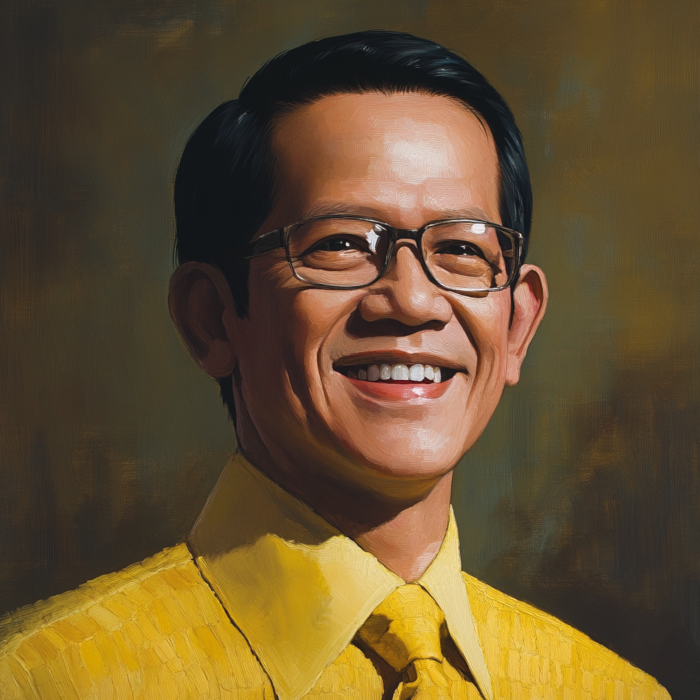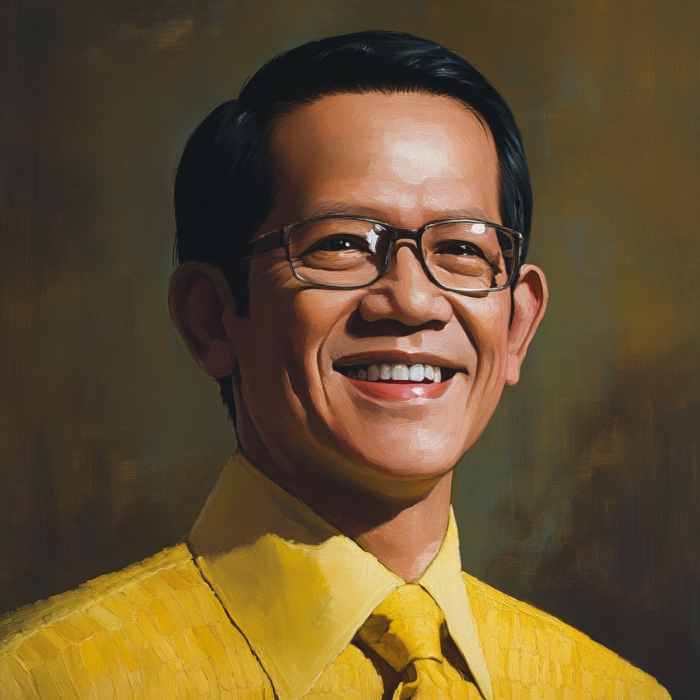


Benigno "Ninoy" Aquino Jr. (1932–1983) was a Filipino politician, journalist, and an opposition leader against the dictatorship of President Ferdinand Marcos. His assassination in 1983 upon returning to the Philippines after years of exile sparked widespread protests and is widely regarded as the catalyst for the People Power Revolution in 1986, which eventually led to the ousting of Marcos and the restoration of democracy in the Philippines. Aquino's martyrdom solidified his status as a national hero and symbol of the struggle for democracy and freedom.
Birth and Family Background: Benigno Simeon "Ninoy" Aquino Jr. was born on November 27, 1932, in Concepcion, Tarlac, Philippines, to a prominent political family. His father, Benigno Aquino Sr., was a politician who served as a speaker of the House of Representatives, while his mother, Aurora Aquino, was from a wealthy and influential family. The Aquino family was deeply involved in politics, and Ninoy grew up in an environment of political engagement.
Education and Early Career: Aquino was a gifted student and attended the Ateneo de Manila University for his early education. He also studied law at the University of the Philippines but did not complete his degree. Instead, he pursued a career in journalism, becoming a war correspondent at the age of 17. His journalistic work covering the Korean War earned him recognition and awards, and his early experiences shaped his critical understanding of politics and power.
Youngest Mayor and Senator: Ninoy Aquino's political career began early. At the age of 22, he became the youngest mayor in the Philippines when he was elected mayor of his hometown of Concepcion in 1955. His political rise continued, and by 1961, at the age of 28, he became the youngest governor of Tarlac province. His charisma, intelligence, and political savvy made him a rising star in Philippine politics.
In 1967, Aquino was elected as a senator of the Philippines, making him one of the youngest senators in the country’s history. As a senator, he gained a reputation as a brilliant orator and reformer, and he became one of the most vocal critics of President Ferdinand Marcos’ administration. He was particularly critical of the growing corruption, authoritarianism, and the alleged human rights abuses under Marcos’ rule.
Opposition to Ferdinand Marcos: By the early 1970s, Aquino had become the most prominent political opponent of Marcos. He criticized the president’s concentration of power, economic mismanagement, and human rights violations. Aquino also revealed alleged corruption within the Marcos government, gaining both the admiration of reformists and the enmity of the Marcos regime.
Martial Law Declaration (1972): In September 1972, President Ferdinand Marcos declared martial law in the Philippines, citing threats of communist insurgency and social unrest. Martial law gave Marcos sweeping powers, allowing him to rule by decree, arrest political opponents, and suppress media and civil liberties. Aquino, as Marcos’ most prominent political rival, was among the first to be arrested. He was imprisoned for nearly eight years, initially without trial, and later sentenced to death by a military court on charges of murder, subversion, and illegal possession of firearms.
Life in Prison: During his years of imprisonment, Aquino was kept in solitary confinement for long periods and faced harsh treatment. However, he used this time to reflect, write, and study. While imprisoned, he famously wrote a letter to his son, Benigno "Noynoy" Aquino III, outlining his beliefs and hopes for the country. Aquino also read extensively, studying philosophy, history, and religion, which deepened his resolve to fight for democracy through peaceful means.
Exile in the United States: In 1980, after suffering a heart attack, Aquino was allowed by the Marcos government to seek medical treatment in the United States under the condition that he would remain in exile. He, along with his family, settled in Boston, where he lived for three years. During this period, Aquino continued to oppose the Marcos regime from abroad, delivering speeches and writing articles that exposed the abuses of the Marcos dictatorship and called for democratic reforms in the Philippines.
Growing Opposition to Marcos: While in exile, Aquino maintained communication with opposition groups and political activists in the Philippines. He worked tirelessly to build international support for the Filipino opposition and sought to unite various anti-Marcos factions. By the early 1980s, the Marcos regime was becoming increasingly unpopular due to worsening economic conditions, allegations of corruption, and human rights abuses.
Return to the Philippines (1983): Despite the personal risk, Aquino decided to return to the Philippines in 1983 to challenge the Marcos regime directly. He believed that his return would galvanize the opposition and inspire the Filipino people to rise against the dictatorship. Before leaving the United States, Aquino famously said, "The Filipino is worth dying for," expressing his commitment to the cause of democracy.
On August 21, 1983, Aquino arrived at Manila International Airport (now Ninoy Aquino International Airport), where he was assassinated as he disembarked from the plane. He was shot in the head by an unknown gunman while under military escort, sparking widespread outrage and protests across the Philippines. Although the assassination was widely believed to have been orchestrated by elements of the Marcos government, the official inquiry failed to conclusively identify the perpetrators.
Impact of the Assassination: Aquino’s assassination became a turning point in Philippine history. His death ignited a wave of protests, strikes, and civil disobedience, uniting various opposition groups and sectors of society against the Marcos regime. The public outcry over his death, combined with the deepening economic and political crisis in the country, paved the way for the People Power Revolution of 1986, a non-violent uprising that culminated in the fall of Ferdinand Marcos.
People Power Revolution (1986): The People Power Revolution, also known as the EDSA Revolution, took place in February 1986. Millions of Filipinos took to the streets in peaceful protest, calling for Marcos to step down. The revolution was triggered by the disputed 1986 presidential election between Marcos and Corazon "Cory" Aquino, Ninoy’s widow, who had become the symbol of the opposition following her husband's assassination. When it became clear that Marcos had rigged the election results, the revolution gained momentum, and Marcos was eventually forced to flee into exile in Hawaii.
Corazon Aquino’s Presidency: Following the People Power Revolution, Corazon Aquino became the 11th president of the Philippines, leading the country through a period of democratic transition. Her administration worked to restore democratic institutions, end the abuses of the Marcos era, and implement economic and social reforms. Corazon Aquino's presidency, which lasted from 1986 to 1992, was seen as the fulfillment of her husband’s legacy, though it was also marked by political instability and challenges.
Symbol of Democracy and Freedom: Ninoy Aquino is widely regarded as a national hero and martyr in the Philippines. His assassination and the subsequent People Power Revolution are seen as pivotal moments in the country’s struggle for democracy. Aquino’s courage, integrity, and unwavering commitment to peaceful change inspired millions of Filipinos to stand up against tyranny, and his legacy continues to influence political and social movements in the Philippines today.
Honors and Memorials: In honor of his sacrifice and contributions to the nation, several institutions, landmarks, and events bear Aquino’s name. Ninoy Aquino International Airport (NAIA) in Manila, where he was assassinated, was named after him, and August 21, the date of his death, is observed as Ninoy Aquino Day, a national holiday in the Philippines. His life and contributions are studied in schools, and he remains a symbol of resistance against authoritarianism.
Political Dynasty: The Aquino family has played a significant role in Philippine politics. After Ninoy's assassination and Corazon Aquino’s presidency, their son, Benigno "Noynoy" Aquino III, also became president of the Philippines, serving from 2010 to 2016. Noynoy Aquino’s election was seen as a continuation of his parents’ legacy of democratic governance and reform.
Benigno "Ninoy" Aquino Jr. was a pivotal figure in the history of the Philippines, remembered for his unwavering opposition to Ferdinand Marcos’ dictatorship and his commitment to democratic ideals. His assassination galvanized the Filipino people to rise against tyranny and reclaim their democracy through the People Power Revolution. Today, Aquino is revered as a martyr for freedom, and his legacy continues to inspire those fighting for democracy and human rights, both in the Philippines and around the world. His life and death stand as a powerful reminder of the sacrifices made in the pursuit of justice and liberty.

We use cookies
We use cookies and other tracking technologies to improve your browsing experience on our website, to show you personalized content and targeted ads, to analyze our website traffic, and to understand where our visitors are coming from. Privacy Policy.